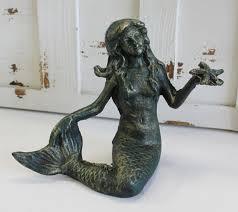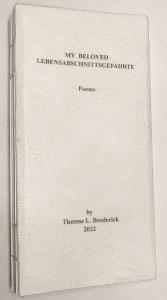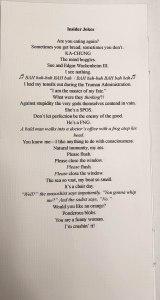
For my recent 75th birthday — in a addition to a cake, a new cushion for my outdoor recliner, a mermaid sculpture, a piece of furniture, and a mess of chocolate — my wife Therese presented me with a book of poems.
A handmade gem of a volume she’d written and painstakingly crafted. Titled My Beloved Lebensabschnittsgefahrte (that’s German for “life travels companion”). She’s a serious poet. But these poems were not grave in tone. She said her aim was to hear my laughter. Indeed, my laughter was itself a key theme in these poems.

They succeeded. I howled. She’d spent a year perfecting these poems, and it showed. Not “roses are red” type poems but beautifully conceived and expressed, a true work of art.
Having a wife who’d go to such effort to please me, to such good effect, would have been blessing enough. But the content furthermore described virtues galore that she values in me — a sense of humor again holding center stage. All ridiculously flattering — and not tongue-in-cheek.
The back cover is a compendium of catch phrases in our marriage — that we laugh together about. Like “Sue and Edgar Wachenheim III.” They’re funders for PBS’s “Nature” series, and every time we see that on the screen I say the names aloud. Wachenheim is kind of a funny name, but that “III” really does it. Suggesting they’re a third generation of Sue and Edgar Wachenheims.

“Sometimes you get bread and sometimes you don’t.” Spoken to us by a New Orleans Maitre d’ when we pointed out lack of a bread basket. A useful metaphor phrase in many subsequent situations.
“I see nothing.” The refrain of German Sergeant Schultz on TV’s “Hogan’s Heroes,” shutting his eyes to what American inmates in his POW camp were getting up to. A useful phrase in a marriage.
Also included were the first and last lines of my favorite jokes:
“A bald man walks into a doctor’s office with a frog atop his head . . . ” (The doc says, “What seems to be the trouble?” And the frog says, “I’ve got this man stuck to my butt.” Note that his baldness is important for visualization.)
And —
“Well,” the masochist says impatiently, “you gonna whip me?” And the sadist says, “No.” (You see, he wants to inflict pain, but the masochist enjoys pain, so the way to make him suffer is to deny him pain. Yet actually, if that does make him suffer, isn’t that giving him what he craves after all?)

It was really impressive to see, embodied in this book, the breadth of the mutual culture we’d created in our 34 years together. How much binds us together. Not just laughs, of course, but so much more. This book shows how much Therese loves me. And why I love her so much. For all the right reasons.
Thank you, Therese.
